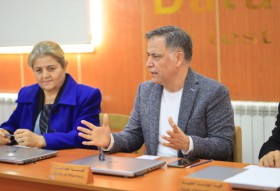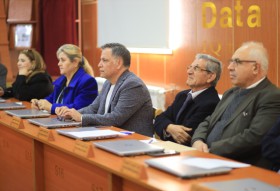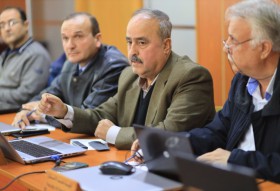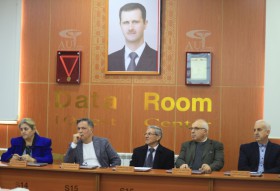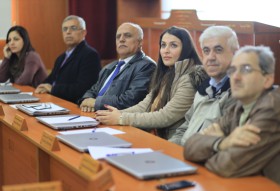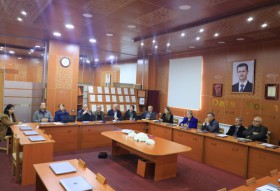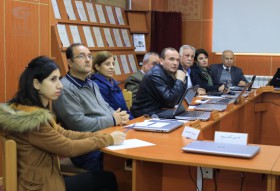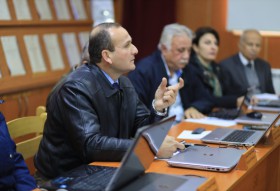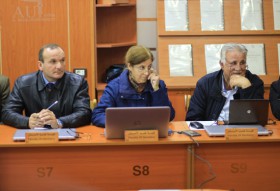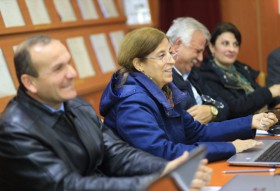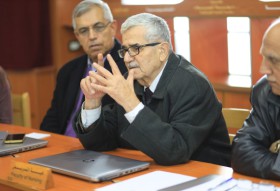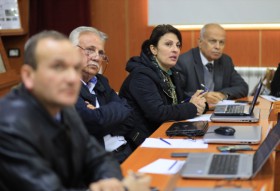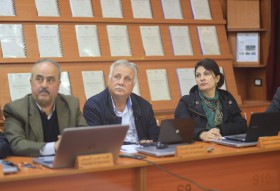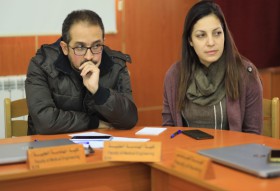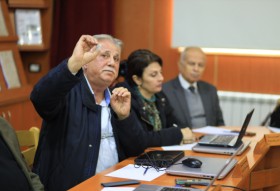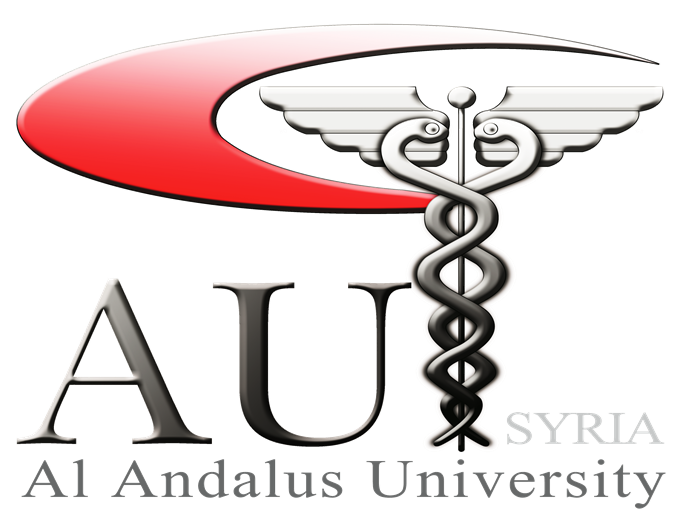A Workshop on the Prospects of the Development of the Biology Curriculum in Al-Andalus University Faculties
- Publish Date:
- 28/11/2022
Under the auspices of Prof. Dr. Mohammad Amer Al-Mardini, University President, and as part of the activities of the Basic Sciences Development Program at Al-Andalus University, a workshop was held on Saturday 26-11-2022 at the Scientific Research Committee to develop the biology curriculum in the university faculties.
Prof. Dr. Mohammad Yehia Mualla, Chairman of the Scientific Accreditation Committee, gave a speech in which he welcomed the attendees and pointed out the importance of acquainting the university with international scientific schools in the fields of basic sciences, and biology in particular, which is taught in five out of the six faculties in the university; biology is a foundation for many clinical courses and body of research in medical faculties, such as drugs, medicines, stem cells, genetic engineering, PCR techniques, and other medical and pharmaceutical technologies and fields.
Then Prof. Dr. Abd Al-Naser Harfouch, Chairman of the University's Board of Trustees, spoke about the importance of administering these basic sciences workshops, which have been receiving positive response, as work will be done in the future to benefit from this experience in developing and studying the status quo of all sciences and courses at Al-Andalus University.
Then Prof. Dr. Mohammad Amer Al-Mardini, University President, addressed the urge to angle the course contents of basic sciences in a direction which serves both the specialized scientific orientation of each faculty and the courses of subsequent specialized years. Prof. Dr. Al-Mardini also pointed that within the series of scientific activities at the university and in coordination with the Scientific Accreditation Committee, five workshops have been approved to be held for the fields of psychology, sociology, Arabic, English, and initiative taking.
Then Prof. Dr. Abdul Karim Ayash, Head of the Biology Curriculum Development Workshop, welcomed the attendees and introduced the workshop members who had worked closely and intensively for six weeks in order to prepare a comprehensive report on the current status of teaching biology courses in the faculties of Al-Andalus University. Prof. Dr. Ayash compared the status quo of biology in AU with what is being taught in medical faculties in a number of international universities in order to reach a global scientific standard in accordance with the requirements of international accreditation according to ACQUIN Foundation.
The instructors of biology courses at the university faculties, Prof. Dr. Abdul Karim Ayash, Dr. Hassan Hasan, Prof. Dr. Adeeb Zaini, Prof. Dr. Thilal Kattan, Prof. Dr. Asmahan Zeinab, Dr. Yasar Saqr, Dr. Wassim Suleiman, Dr. Yara Melhem, and Ms. Noha Kalthoum; have provided a detailed explanation of the course contents of biology courses in Plant Biology, Animal Biology, Cell and Heredity, Molecular Biology, Biotechnology, and Microbiology) in the various faculties of the university. The previously mentioned instructors also compared these course contents and biology teaching methodologies with their counterparts in a number of the world leading universities in Britain, France, Germany, America, Russia, China, India, and Italy. They also reviewed the modern international scientific references upon which the teaching of these courses relies, and the scientific journals that tackle the contents of biology courses and scientifically support the scope of biological research.
Prof. Dr. Muhammad Yahya Mualla, Chairman of the Scientific Accreditation Committee, opened a speech in which he welcomed the attendees, and pointed out the importance of learning about international scientific schools in the fields of basic sciences, especially biology, which is taught in five of the six faculties at the university. He said: “Biology constitutes a major base for many clinical courses and research in medical colleges such as pharmacognosy, drugs, stem cells, genetic engineering, PCR techniques and other technologies in medical and pharmaceutical fields”.
Dr. Abdul Nasser Harfouche, Chairman of the Board of Trustees at the university, spoke, pointing to the importance of holding basic science workshops, which received a positive response, as work will be carried out in the future to benefit from this experience in developing all curriculums and courses at the Al Andalus University.
Prof. Dr. Muhammad Amer Al-Mardini, President of the University, spoke and pointed out the importance of directing the vocabulary of basic science courses to serve the specialized scientific orientation of each faculty and the specialized courses of subsequent years. He noted that it was approved within the series of scientific activities at the university and in coordination with the Scientific Accreditation Committee to create five new workshops in the fields of psychology, sociology, Arabic language, English language and entrepreneurship.
Prof. Dr. Abdulkarim Ayash, head of the Biology Curriculum Development Workshop, spoke, welcomed the attendees, and introduced the members of the workshop who worked collaboratively and intensively during six weeks in order to prepare a comprehensive report on the reality of teaching biology courses in the faculties of Al Andalus University. He said: “The members of the workshop compare the content of biology curriculum at our university with what is taught in medical colleges in a number of international universities in order to reach a international accreditation according to ACQUIN”.
The lecturers of biology courses at the university (Prof. Dr. Abdulkarim Ayash, Dr. Hassan Hassan, Prof.Dr. Adeeb Zaini, Prof. Dr. Zelal Kattan, Prof. Dr. Asmahan Zainab, Dr. Yasar Saqr, Dr. Wassim Suleiman, Dr. Yara Melhem, Ms. Noha Kulthum) gave a detailed explanation of the vocabulary of biolog courses (plant biology, zoology, cell and genetics, molecular biology, biotechnology, microbiology) in the various faculties of the university, and they compared these vocabulary with their counterparts in a number of leading universities in the world (British, French, German, American, Russian, Chinese, Indian, Italian), and the way they are taught in those universities. They also reviewed modern international scientific references that are based on teaching these courses, and scientific journals that address the chapters being taught in this specialty, and scientifically support research.
At the end a discussion was held about the method of teaching and vocabulary of life science courses at Al Andalus University and its counterparts in international universities, and the points of similarity, which sometimes reached more than 90%, points of difference. The scientific meeting committee agreed to develop biology courses with a focus on the specialized scientific direction in each faculty.
